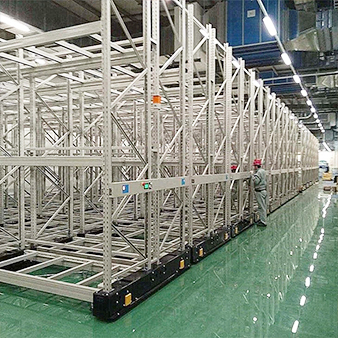The integration of storage shelves and intelligent storage equipment has the potential to significantly transform warehouse management by enhancing efficiency, accuracy, and overall productivity. Here are several ways in which this integration can change warehouse management:
Real-time Inventory Tracking:
Intelligent storage equipment, such as RFID and barcode systems, allows for real-time tracking of inventory. This means that warehouse managers can monitor stock levels, item locations, and movement patterns at any given moment, reducing the risk of stockouts and overstocking.
Optimized Space Utilization:
By analyzing data from intelligent storage equipment, warehouses can better utilize space. This includes adjusting shelf heights, storage locations, and layouts to accommodate changing inventory needs and maximize space usage.
Automated Order Picking:
Automated storage and retrieval systems (AS/RS) and robotic technology can streamline the order picking process. Robots can access and retrieve items from shelves quickly and accurately, reducing the need for manual labor and improving order fulfillment times.
Error Reduction:
Integrating intelligent storage systems minimizes human errors in inventory management. This results in fewer inaccuracies, misplaced items, and shipping errors, which can improve customer satisfaction and save on costs associated with returns and refunds.
Enhanced Order Accuracy:
With the assistance of intelligent storage and picking systems, the accuracy of order fulfillment is greatly improved. This reduces the likelihood of shipping the wrong items or quantities to customers.
Data-driven Decision-making:
The data collected by intelligent storage equipment can be used for data analysis and informed decision-making. Warehouse managers can identify trends, optimize storage strategies, and make strategic adjustments based on historical data.

Energy Efficiency:
Some intelligent storage systems are designed to optimize energy consumption. They can control lighting, temperature, and equipment usage based on demand, which reduces energy costs and environmental impact.
Dynamic Slotting:
Intelligent systems can continually assess which products are in high demand and move them to more accessible locations. This dynamic slotting ensures that popular items are readily available for order picking.
Enhanced Security:
Smart storage systems often come with advanced security features, such as access control and video surveillance, to protect valuable inventory.
Labor Optimization:
Labor-intensive tasks, such as counting and locating items, can be automated or significantly reduced, allowing employees to focus on higher-value tasks like quality control and customer service.
Lean Inventory Management:
Intelligent storage and tracking systems can facilitate just-in-time inventory management practices, reducing the need for excess inventory and associated carrying costs.
Flexible Scalability:
Smart storage systems are often designed to be easily scalable, allowing businesses to adapt quickly to changing inventory needs and expand their storage capabilities without extensive construction.
Predictive Maintenance:
Intelligent systems can monitor the health and performance of storage equipment, alerting maintenance teams to issues before they lead to costly breakdowns.
Continuous Improvement:
Data and insights from intelligent storage systems can be used to drive continuous improvement initiatives, making warehouse operations more efficient over time.
The integration of storage shelves and intelligent storage equipment empowers warehouse managers to operate more efficiently, make data-driven decisions, reduce operational costs, and enhance overall warehouse performance. As technology continues to advance, the impact on warehouse management is likely to become even more significant.